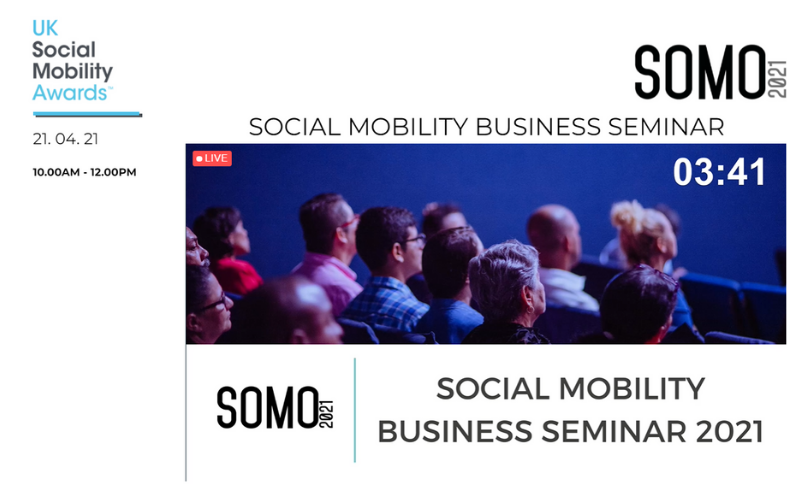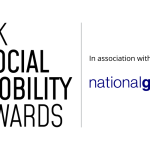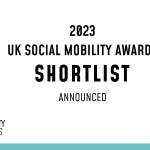Social Mobility Business Seminar 2021
The UK Social Mobility Awards (SOMOs) held the fourth annual Social Mobility Business Seminar in April. The Social Mobility Buisness Seminar was the first event in the SOMO2021 calendar and provided a great chance for those interested in social mobility or for organisations doing great work to advance the cause, to come together and get involved in the necessary conversations about how investing in social mobility can have significant benefits to businesses.
Due to the unprecedented challenges and changes we have faced over the past year, the Seminar was held virtually, with our guests watching via livestream. Despite the differences to this year’s format, the event continued to provide a platform to hold candid discussions around social mobility, as the guests had the opportunity to get involved in the conversations with our excellent speakers and panellists via social media and a question button.
The opening address of the Seminar was from Nadhim Zahawi MP – Parliamentary Under Secretary of State (Minister for Business and Industry) and Parliamentary Under Secretary of State (Minister for COVID Vaccine Deployment) – who has supported the SOMOs and spoken annually at the event since the Social Mobility Business Seminar in 2019.
Nadhim used his address to inform the audience of the importance of social mobility in the face of the COVID-19 pandemic, stating that “social mobility deserves equally proactive development now more than ever – it is essential for economic recovery.” He finished his speech by reinforcing his support for the social mobility cause, then urged those individuals and organisations who are doing the work to advance the movement and “use this momentum to build back better – as a springboard to really enhance your work, the fantastic work that you are already doing, because social mobility is at the heart of uniting and levelling-up the country.”
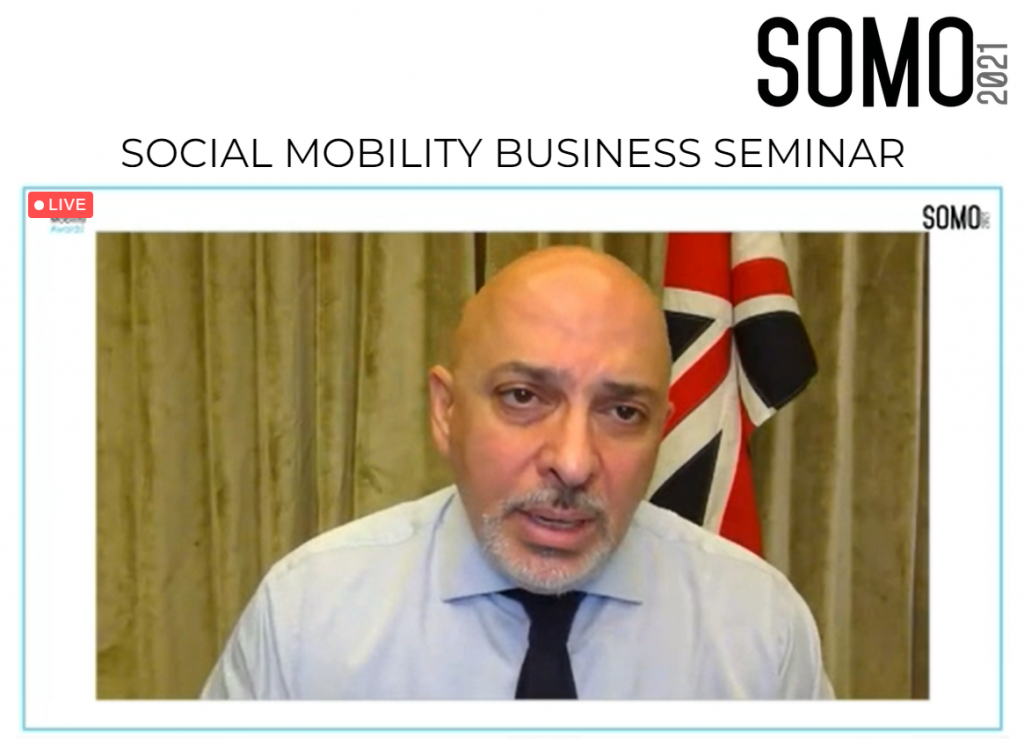
Nadhim Zahawi MP
Following this speech, we heard from Farrah Storr, the Editor-in-Chief of Elle UK and a Commissioner at the Social Mobility Commission. Farrah started her speech by addressing what elitism looks like in UK businesses by highlighting the “deliberately ambiguous, widely vague and highly unspecific” language that is used almost unintentionally by hiring managers as an unconscious strategy to further exacerbate the barriers to social mobility.
Farrah then went on to talk about the barriers to accessing opportunities for those from lower socio-economic backgrounds, stating that while over the last few years there has been things done to help this, there is still a problem in UK businesses. She states that through research taken over the years, we can see that “the concept of fitting in plays out in most organisations. We feel comfortable with people like us, it is in our blood. But it’s a mistake. The more diverse the workforce, the greater the opportunity for creativity, affinity with a wider client base, and profitability.” Farrah finished her speech with a strong call to action for those organisations who understand there is still vital work to do for the progression of social mobility in the UK and encouraged people to not “hide your own story, be truthful about what it takes, don’t mask your real identity.”
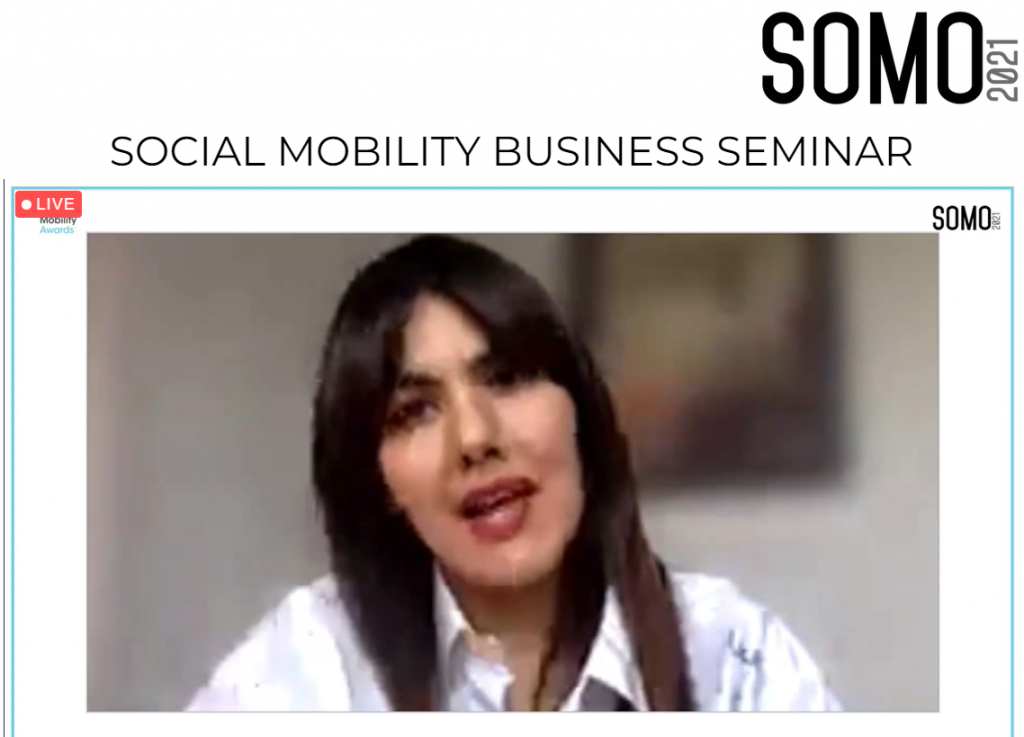
Farrah Storr
The next speech came from Alderman Vincent Keaveny, Senior Alderman, City of London Corporation, Partner at DLA Piper, and the Co-Chair of the Socio-Economic Diversity Taskforce. Vincent took this opportunity to delve more into an initiative run by the City of London Corporation, which aims to boost socio-economic diversity at senior levels in the UK’s financial and professional sectors – the Socio-Economic Diversity Taskforce. Vincent went on to highlight the need for the Taskforce and the opportunities that it presents for UK businesses and the economy as a whole.
Significantly, Vincent reiterated a point made by Farrah about the importance of data and how it “is essential in tracking senior levels of seniority, developing action plans, actually making progress on this cause.” The data that is collected helps to gauge where organisations are in their social mobility efforts, and this information will go a long way in helping to make the advancement of social mobility more achievable.
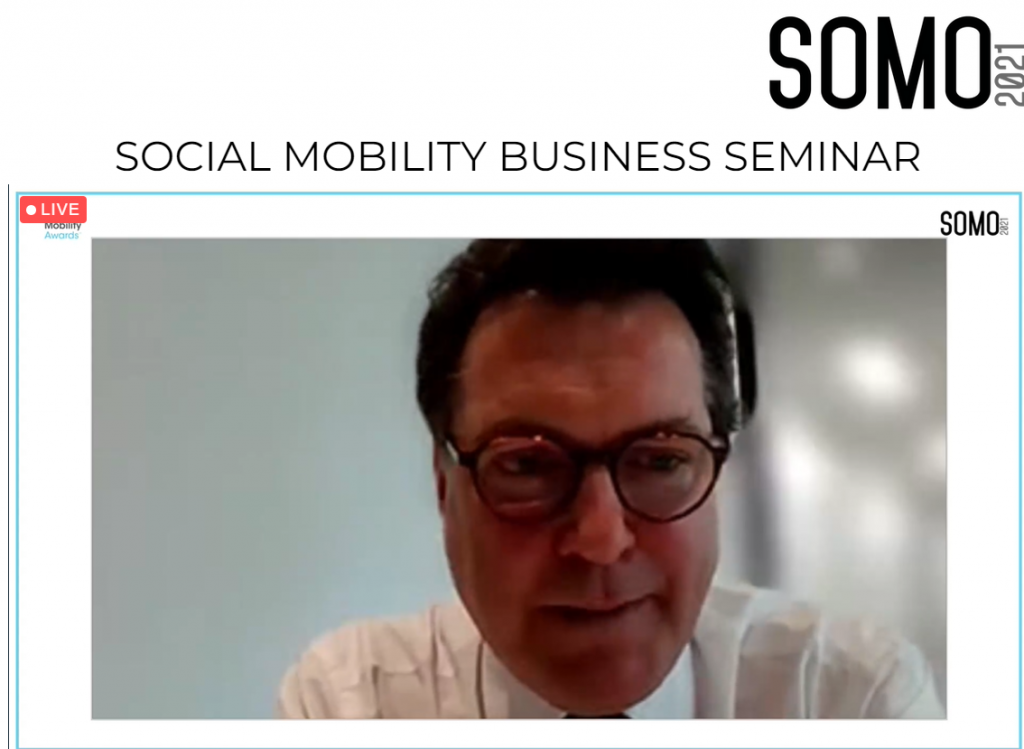
Alderman Vincent Keaveny
The Seminar then moved on to a panel discussion which was chaired by Tunde Banjoko OBE, and we saw Chris Stylianou OBE, the Chief Operating Officer at Sky UK & ROI, as well as Alison Gurd, the Global Head of Proposal Management at BNP Paribas UK, join Vincent and Farrah on the panel. Here was the opportunity to hear more from some champions in the social mobility movement, in a debate style format, on social mobility best practice and how to approach the advancement of this cause.
The topic of the panel discussion was Social Mobility in a Crisis. When asked about why social mobility matters during a time when organisations and businesses are facing many other significant challenges, Vincent stated that “this is a real moment of change”. He pointed out that during the COVID-19 pandemic, businesses have learnt to adapt the way they work and change their structures to reflect the pandemic. He added that “with this comes a real opportunity to reinvent some of the challenges which have previously held back social mobility”.
Alison backed the notion that this is a ‘moment of change’, that we need to keep the agenda high priority and public as “the crisis has identified the imbalance across the UK… nobody should be blinkered to the situation of social mobility.” Her worry was that as businesses desire and rush to get back to their normal routines, this agenda may be pushed to the background and the question is, how will we keep this momentum going?

Seminar Panel: Farrah Storr, Alison Gurd, Tunde Banjoko OBE, Alderman Vincent Keaveny, and Chris Stylianou OBE
When talking about the topic of what social mobility looks like in his businesses during a pandemic, Chris suggested that “for businesses of our scale… that sometimes means we have to think outside of the box and break things in our organisations to do exactly that.” Chris highlighted that organisations like his have a responsibility to create more opportunities, and he encouraged businesses to share their tips to best practice at putting social mobility at the heart of their organisations.
After the panel discussion came a Q&A session, with the floor opening up for audience questions. From discussing socio-economic status, recruitment practices, and further education opportunities, this time provided the attendees to obtain more information about specific subjects, as well as gain a broader understanding in general of the business imperatives to social mobility. The Social Mobility Business seminar 2021 concluded with a closing statement from Tunde, who urged those attending to enter the 2021 Awards, which are “an opportunity to think about what you are doing in social mobility and shout about it from the rooftops.”
With the nominations for this year’s awards already open, we hope that organisations as well as individuals have been encouraged to do more to advance social mobility in the UK and are inspired to showcase the work they have already been doing over the past year! To find out more about how your organisation can join the movement and enter the awards before the submissions close on 25th June; the details for the entry guidelines can be found here.
Enter the Awards here: UK Social Mobility Awards 2021 (judgify.me)
Follow the UK Social Mobility Awards on social media for all the latest news and updates.
